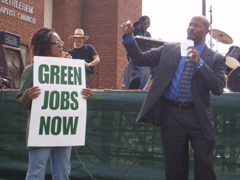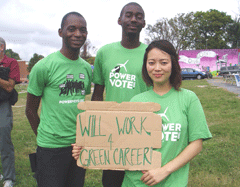A Green Path out of the Red
Air Date: Week of October 3, 2008

As Washington rescues Wall Street, a growing chorus of big thinkers from the left and right are calling for a greener approach-- using investment in clean energy and efficiency as a way to stimulate the economy. Living on Earth's Jeff Young explores the elements of a green economic bailout.
Transcript
[MUSIC: Boards Of Canada “Zoetrope” from “In A Beautiful Place Out In The Country” (Warp Records 2000)]
ANNOUNCER: Support for Living on Earth comes from the National Science Foundation and Stonyfield Farm.
[THEME]
GELLERMAN: From the Jennifer and Ted Stanley studios in Somerville, Massachusetts, This is Living on Earth. I’m Bruce Gellerman, in for Steve Curwood.
With Washington trying to bail out Wall Street with a 700 billion dollar pot of gold, there are those on the left and right who say green is really the way to go, that investments in clean energy and energy efficiency can both stimulate the economy and save the environment. Living on Earth’s Jeff Young reports on what a green bailout might look like.
YOUNG: As the Capitol’s political elite huddled to craft an economic rescue, some other Washington residents in the city’s struggling Anacostia neighborhood rallied for a different kind of economic plan.
CROWD: I’m ready for green jobs now!
[CHEERING, MILLING OF PEOPLE]
YOUNG: It was one of some 700 rallies around the country that day promoting clean energy as a way to generate jobs and wealth. Activist Van Jones, with the Green for All campaign, says that’s where government should be making its investments.
JONES: The people who said we could have a financial strategy based on borrow and spend and bubble and bailout, they’ve had their turn. They’ve been totally discredited. It’s our turn now. Green jobs now! Green jobs now!
YOUNG: Jones says an economic recovery plan should attack many problems at once. If government spending helped idled workers in Anacostia weatherize homes, it would also save energy, cut greenhouse gas pollution and lower utility bills. He calls it greening the bailout.

Green for All activist Van
Jones charges up the crowd in Washington’s Anacostia neighborhood.
YOUNG: It’s not a new idea—Jones has been helping people find work in solar and energy efficiency efforts in the Oakland, California area. And many communities in the windswept states are already at work building turbines for that fast growing energy sector. But as the economy teetered in the past weeks, a green growth agenda really
seemed to gain steam. The opinion pages of the New York Times, Washington Post and other major papers drew parallels between the financial crisis and the climate crisis. And in the latest meeting of the influential Clinton Global Initiative former Environmental Protection Agency director Carol Browner threw out this idea.

College students facing a bleak job market hope green energy investment will brighten the outlook.
YOUNG: Even oil business billionaire T. Boone Pickens, who once bankrolled right wing political attack ads, now buys airtime to encourage renewable energy. When Pickens pushed his energy plan at the National Press Club, he said building a wind energy corridor from Texas through the plains states would boost the flagging economy.
[VOICES AND CLICKING OF DISHES]
PICKENS: Can you imagine how many jobs created in America? Jobs, profits taxes, economy -- America could be revitalized! By just managing our energy properly.
YOUNG: But just how does a bailout aimed at shoring up banks and easing the credit
crunch translate into green jobs? Well, the bailout itself could stimulate green energy by extending tax credits for wind and solar. And some analysts say housing-related assets the government buys could be leveraged to support energy efficient homes. But green jobs author and organizer Bracken Hendricks says the larger opportunities lie in the larger trend we’re now seeing of major government involvement in the markets.
HENDRICKS: We need to be stimulating the businesses and the investments that are really going to improve our productivity by investing in clean energy and renewable energy. And at a time when we are seeing an increasing public role in shoring up financial institutions, this is the time to ask for that sort of a public return on our investment.
YOUNG: Hendricks helped bring business, labor, and environmental groups together in
the Apollo Alliance. He’s now a senior fellow at the progressive policy think tank Center for American Progress. Hendricks thinks Congress will try another economic stimulus package to bring the country out of recession. The last stimulus, you might remember, came in the form of checks straight to taxpayers. Hendricks says a CAP study shows a green stimulus package creates more jobs than just encouraging consumption.
HENDRICKS: That money stays locally—you can’t outsource jobs retrofitting buildings for efficiency or building transit systems. Put aside the environmental benefits. Investing in a green recovery is better economic policy and it puts us on a faster road to recovery.
YOUNG: Hendricks says that would be an attractive option for the next president, no matter who wins in November - both candidates say they support renewable energy. But with the bailout and a slow economy stressing the budget, will the president still be able to pay for large-scale investment? Recent statements from the candidates offer some insight. In the first presidential debate, PBS moderator Jim Lehrer asked Republican Sen. John McCain what he might give up in a tight budget.

Many say a green economy will be a bullish economy.
LEHRER: Spending freeze?
MCCAIN: I think we ought to seriously consider it, with the exceptions the caring of veterans national defense and several other vital issues.
YOUNG: As for spending that might create jobs, McCain said his plan for more nuclear power plants would put hundreds of thousands to work. Democratic Senator Barack Obama emphasized jobs from renewable energy and rebuilding infrastructure. It was a theme he returned to on the Senate floor, just before Wednesday’s bailout vote.
OBAMA: We can¹t wait to create millions of new jobs by rebuilding our roads and bridges and investing in fixing our electricity grid so we can get renewable energy to population centers that need them. These are the priorities we cannot delay.
YOUNG: Just how much energy government puts into growing green jobs could largely depend on how the next president and Congress view clean energy: Is it a luxury to be cut in hard times, or is it part of the way out of hard times?
For Living on Earth, I’m Jeff Young in Washington, DC.
Links
Van Jones and the Green for All Campaign
The T. Boone Pickens plan for energy independence mixes windpower and natural gas
Living on Earth wants to hear from you!
Living on Earth
62 Calef Highway, Suite 212
Lee, NH 03861
Telephone: 617-287-4121
E-mail: comments@loe.org
Newsletter [Click here]
Donate to Living on Earth!
Living on Earth is an independent media program and relies entirely on contributions from listeners and institutions supporting public service. Please donate now to preserve an independent environmental voice.
NewsletterLiving on Earth offers a weekly delivery of the show's rundown to your mailbox. Sign up for our newsletter today!
 Sailors For The Sea: Be the change you want to sea.
Sailors For The Sea: Be the change you want to sea.
 The Grantham Foundation for the Protection of the Environment: Committed to protecting and improving the health of the global environment.
The Grantham Foundation for the Protection of the Environment: Committed to protecting and improving the health of the global environment.
 Contribute to Living on Earth and receive, as our gift to you, an archival print of one of Mark Seth Lender's extraordinary wildlife photographs. Follow the link to see Mark's current collection of photographs.
Contribute to Living on Earth and receive, as our gift to you, an archival print of one of Mark Seth Lender's extraordinary wildlife photographs. Follow the link to see Mark's current collection of photographs.
 Buy a signed copy of Mark Seth Lender's book Smeagull the Seagull & support Living on Earth
Buy a signed copy of Mark Seth Lender's book Smeagull the Seagull & support Living on Earth

